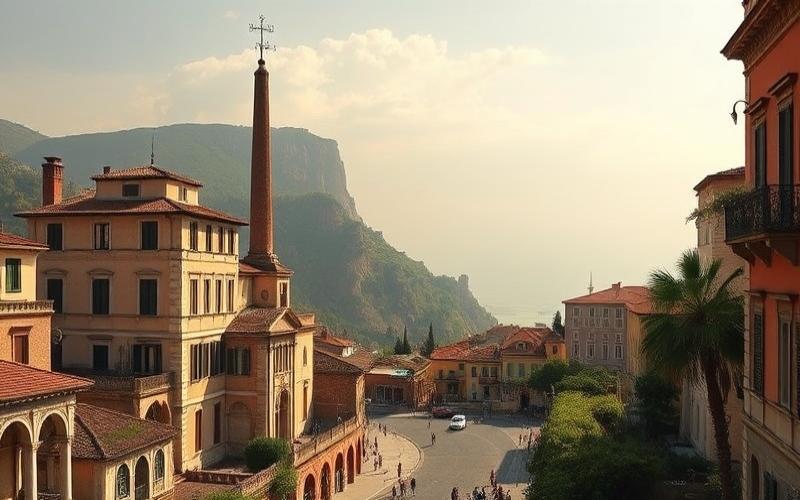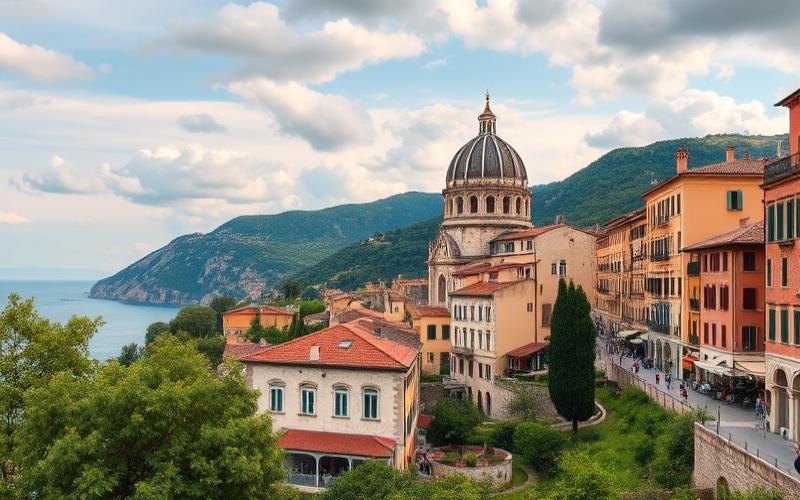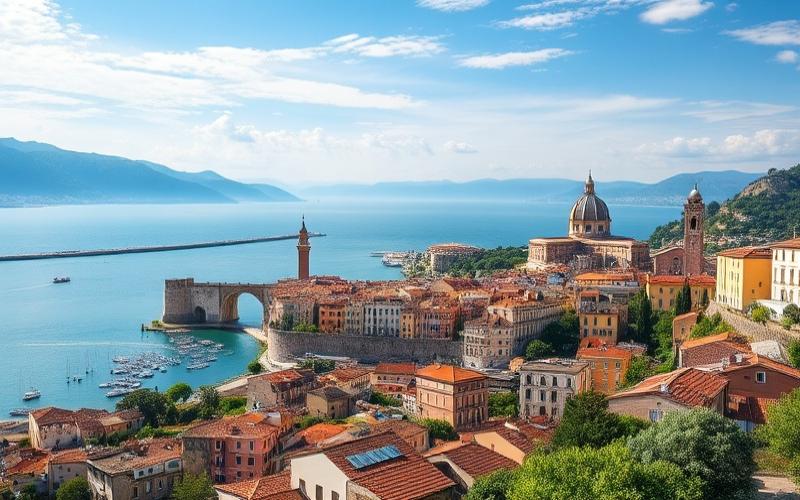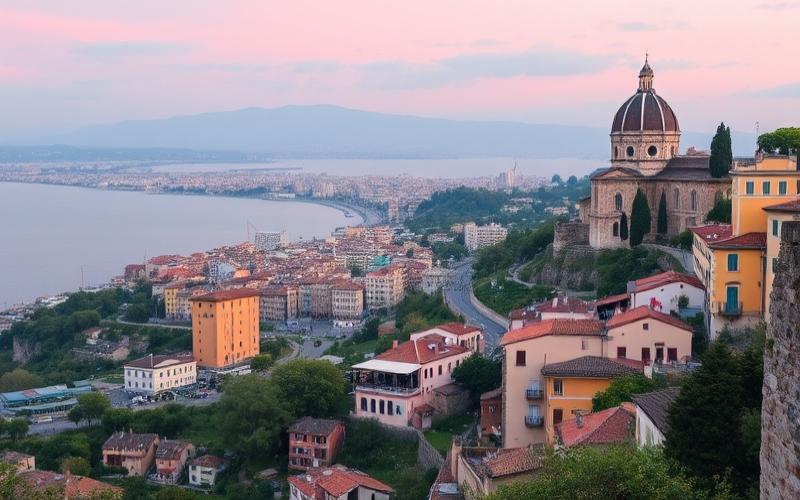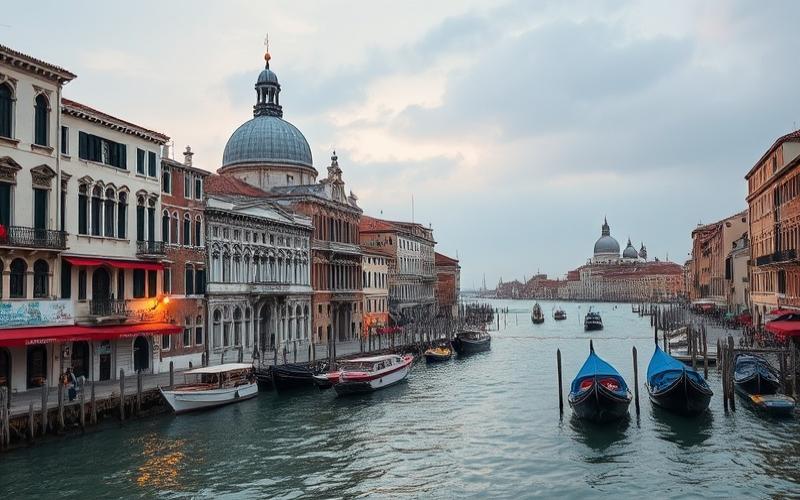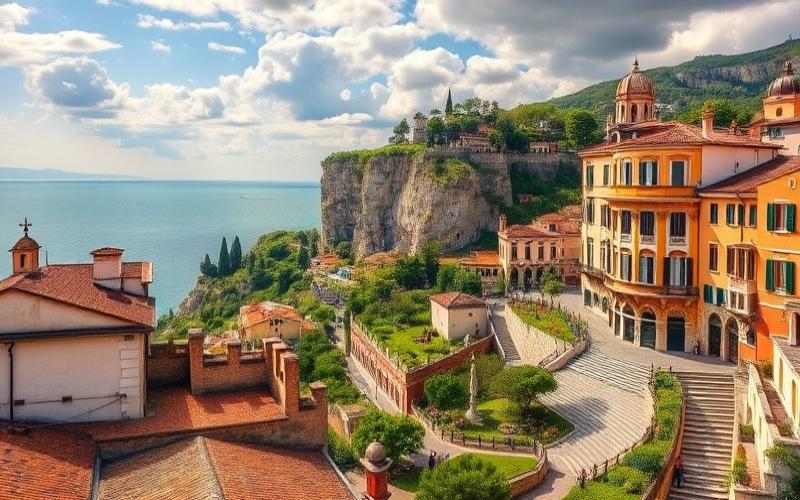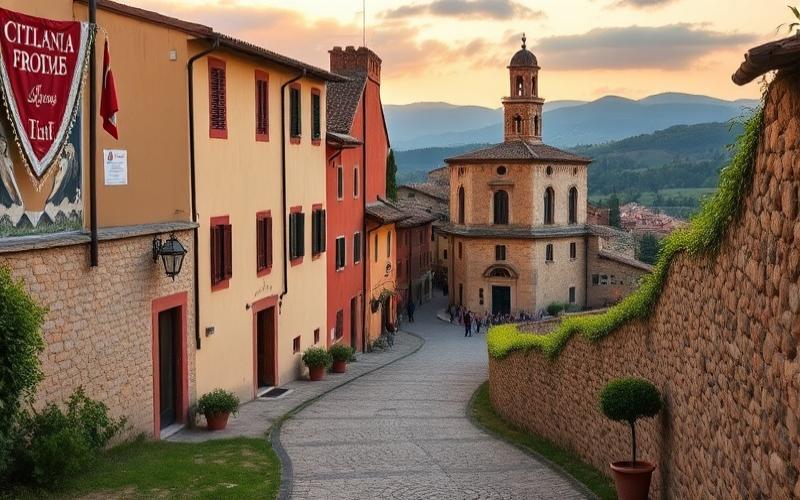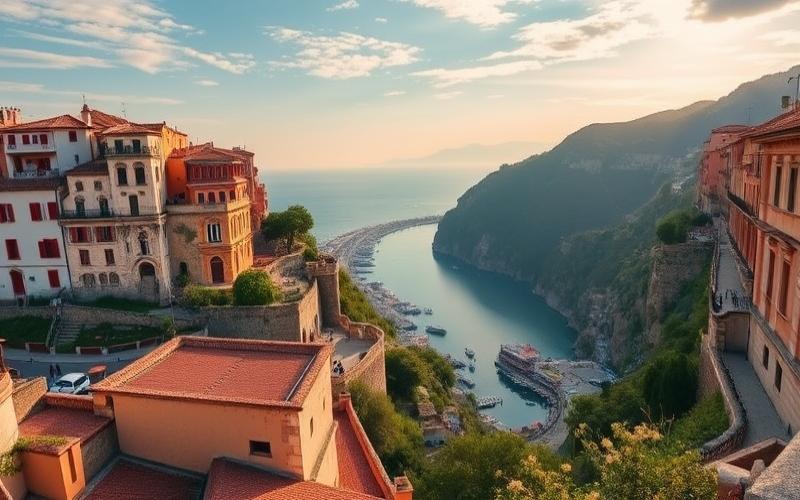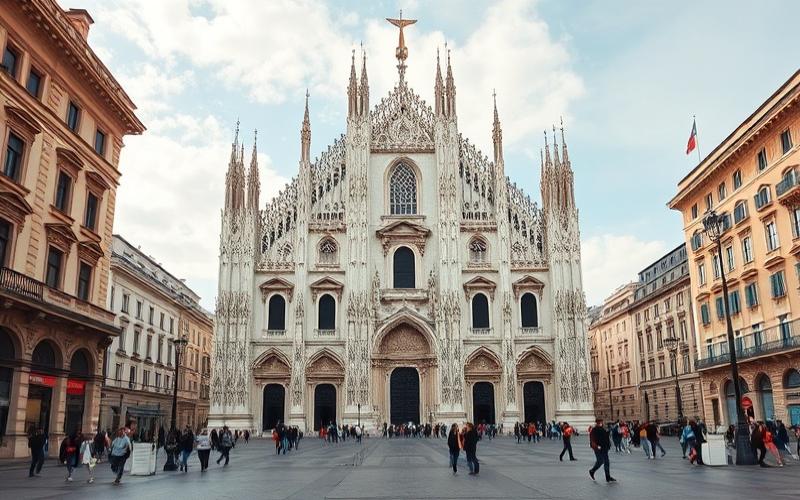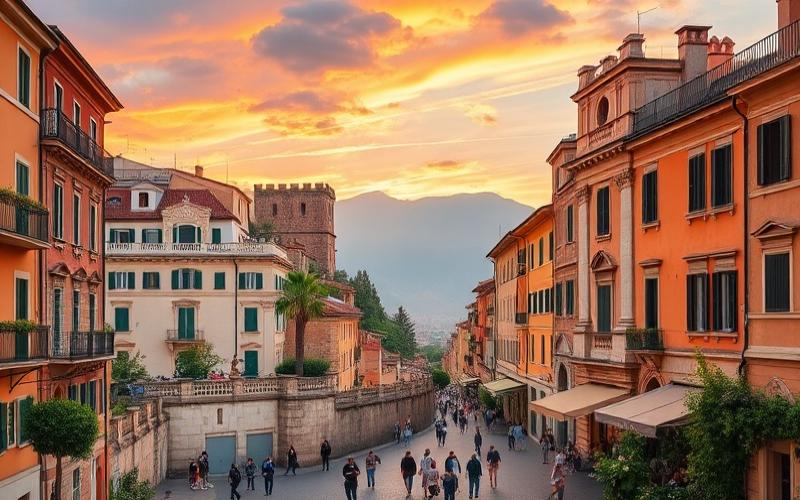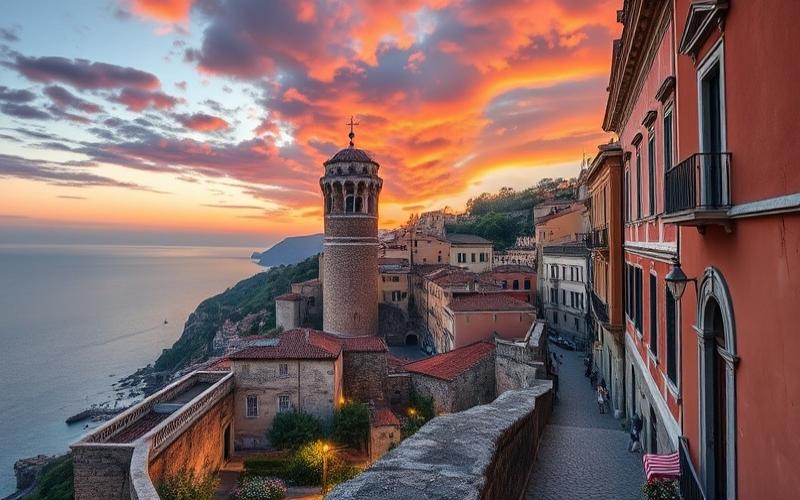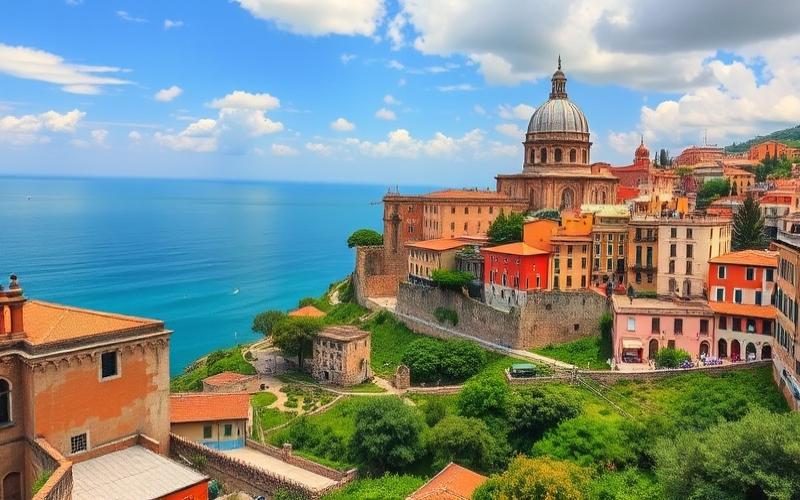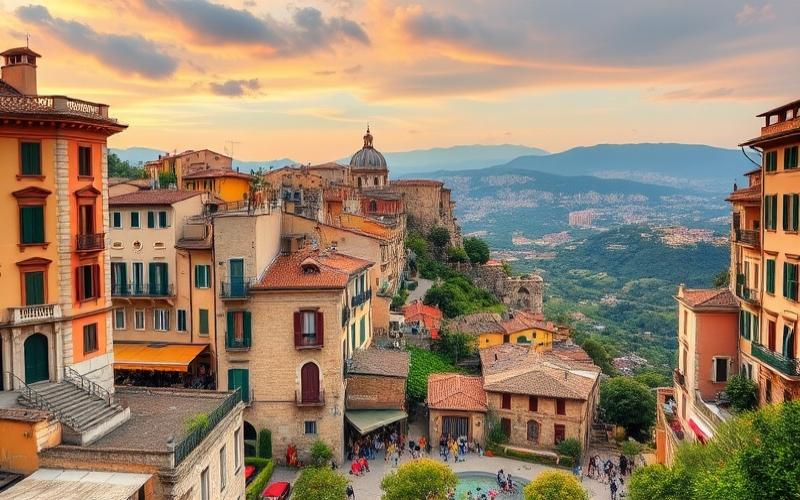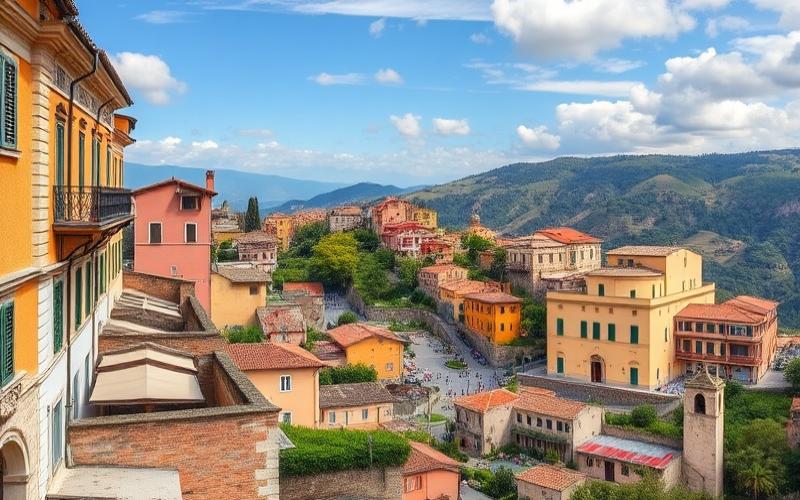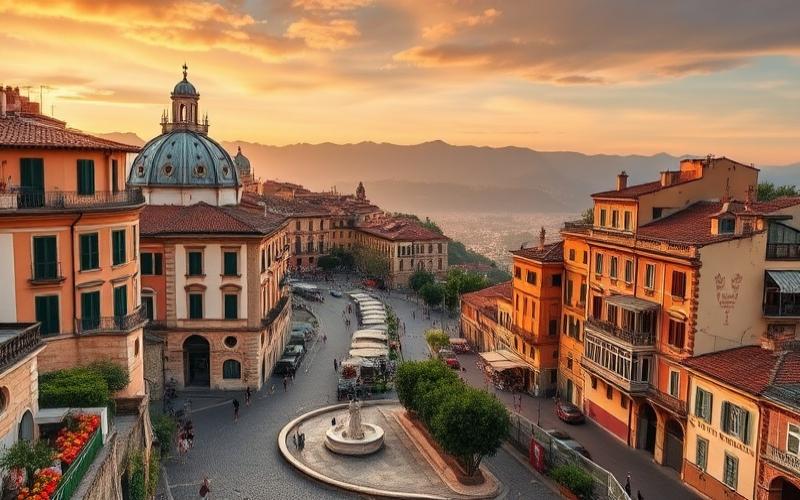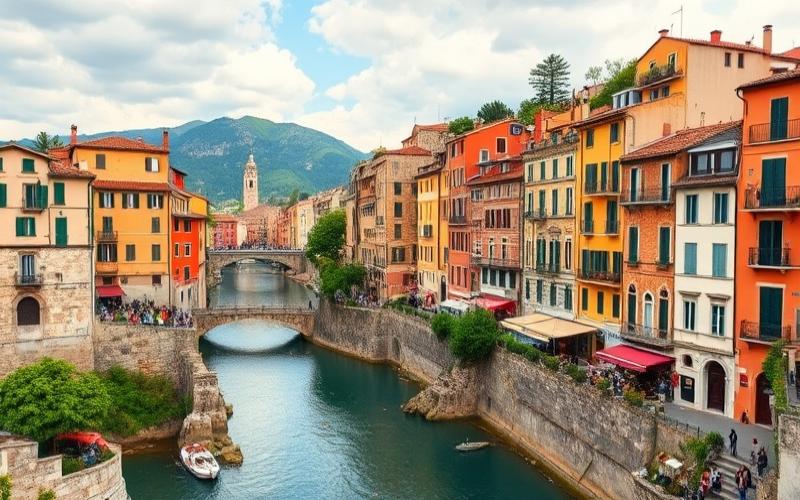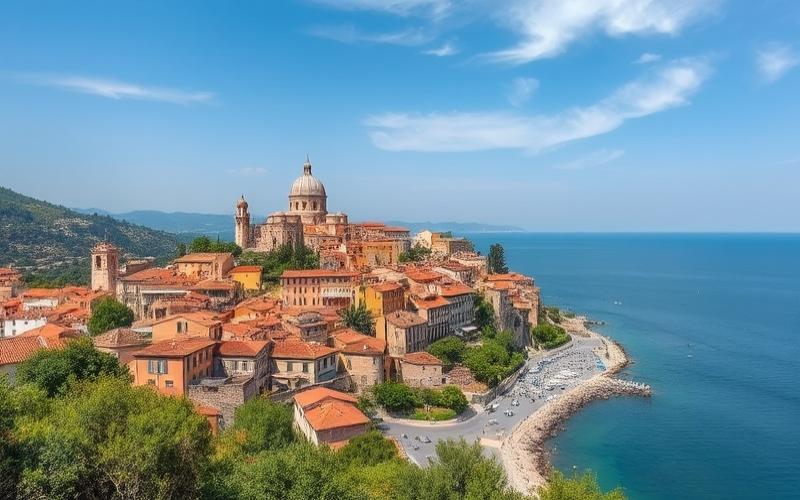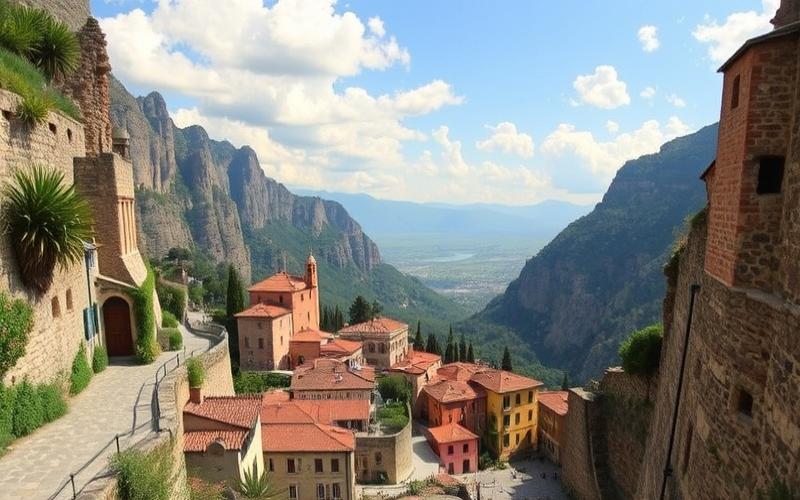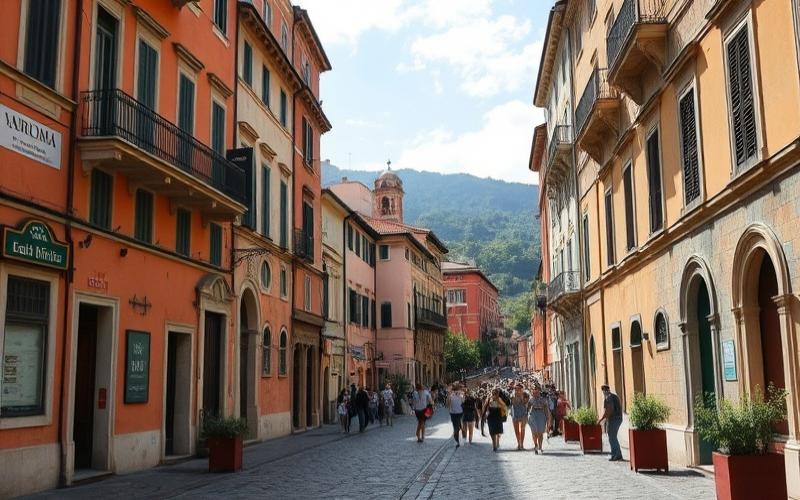
 Published on and written by Cyril Jarnias
Published on and written by Cyril Jarnias
Moving to Italy: Finding Your Expat Community
Moving to a new country can be a rewarding adventure, but knowing where to build connections is essential to turn this experience into a true success. In Italy, a country rich in history and culture, expatriate communities play a crucial role in the integration and support of newcomers.
Whether you’re drawn to the energy of cities like Rome or Milan, or the tranquility of Tuscan villages, finding your expat network can ease your adjustment and enrich your experience.
Good to Know:
Expat groups often organize cultural events and informal gatherings, ideal for breaking the ice and building connections.
Why Join an Expat Community in Italy?
This article will guide you with practical advice and leads to meet like-minded people, promising wonderful encounters and a strong network in this beautiful country.
Facilitating Social Integration in Italy
Integration networks for expatriates in Italy include welcome associations, NGOs and inclusion cooperatives, business clubs and expat circles, and community initiatives offering Italian classes, cultural events, and volunteering.
French-Speaking and International Welcome Associations
- Milan Accueil (FIAFE): activities, daily support, cultural discoveries, over 350 member families in Milan.
- Network of French Associations in Central and Southern Italy (via the consulate): active community life, support for local initiatives.
- Welcome Association Italy (WAI): language courses, visa advice, health insurance, professional networking for foreigners.
NGOs, Cooperatives, and Community Engagement Initiatives
- Caritas: housing assistance, social integration, Italian classes, and emergency aid.
- Social cooperatives (e.g., Camelot, Emilia-Romagna): mentorship, Italian classes, training, internships, and involvement of immigrants in cooperative governance.
- Global Shapers (hubs in Rome, Milan, Venice): local projects on sustainability, mental health, volunteering, and mutual aid among young professionals.
Clubs and Circles for Expats and Professional Networking
International business clubs and expat circles present in several cities, with informal meetups, dinners, and social activities.
Examples mentioned: Club France Italie, International Business Association of Italy.
Types of Events Promoting Integration
Cultural meetup groups, art openings, concerts, food festivals, and sports events to build connections in a relaxed setting.
Workshops and language meetups (tandems, language cafes) often offered by welcome associations, WAI, and local charitable organizations.
Main Italian Cities Where These Networks Are Active
- Rome: Global Shapers hubs, associative networks, and major cultural events attracting expatriates.
- Milan: high concentration of welcome associations (Milan Accueil), international business clubs, and professional events.
- Florence: rich cultural life conducive to meetings, supported by associative networks and events for expats.
- Other hubs: Venice (Global Shapers hub) and Bologna–Ferrara (integration cooperatives like Camelot).
Using Online Platforms and Social Networks
- LinkedIn to join expat groups in Italy, follow local companies, participate in sector discussions, and contact associations and clubs.
- Websites and pages of welcome associations, WAI, Caritas, and cooperatives for event calendars and online registration.
- Community groups by city (Rome, Milan, Florence) via social networks to find language tandems, coliving, volunteering, and event announcements.
Table: Where to Look for What Based on Need
| Key Need | Main Actors | Key Cities | Activity Formats |
|---|---|---|---|
| Italian classes and administrative support | WAI, Caritas, social cooperatives | Rome, Milan, Bologna–Ferrara | Classes, social service desks, integration workshops |
| Social and cultural network | Welcome associations (e.g., Milan Accueil), consular networks | Milan, Rome, Florence | Cultural outings, meetup cafes, family activities |
| Professional network | Business clubs, expat circles, LinkedIn | Milan, Rome, Florence | Professional meetups, dinners, sector groups |
| Civic engagement and projects | Global Shapers, cooperatives | Rome, Milan, Venice, Emilia-Romagna | Volunteering, local projects, thematic workshops |
Practical Tips for Overcoming Language and Cultural Barriers
- Start a mixed language plan: structured courses (WAI/Caritas/cooperatives), + weekly tandems, + micro-goals (10 words/day, daily scenarios).
- Prioritize immersion: local volunteering (Caritas, cooperatives), clubs and cultural associations to practice Italian in real context.
- Use LinkedIn to identify local groups, contact event organizers, and convert connections into in-person meetings.
- Adopt Italian relational codes: flexible punctuality depending on context, warm greetings, using first names after introduction, and formal politeness at first contact (Lei).
- Prepare conversation scripts (introducing yourself, asking for a service, scheduling an appointment) and test them at language cafes/welcome meetups.
- Diversify circles: alternate cultural events, professional meetups, and family activities to multiply social entry points.
- Seek neighborhood communities and interest-based groups (sports, food, art) to accelerate integration and reduce anxiety in large groups.
- Keep an exposure journal (hours of spoken Italian/week, new contacts, events) to track progress and adjust efforts.
Good to Know:
To facilitate social integration in Italy, join expat organizations and clubs that abound in major cities like Rome, Milan, and Florence. These networks offer cultural meetup groups, such as the Associazione Culturale Italiana, and organize language events to learn and practice Italian. Community engagement initiatives also allow interaction with locals and exploration of Italian cultural diversity. Leverage online platforms and social networks, such as Meetup or Facebook, to connect with other expats and follow local event news. To overcome language barriers, consider apps like Duolingo and participate in language tandems, where a native Italian speaker can introduce you to the local language in exchange for your native language. This not only improves your Italian but also reduces cultural misunderstandings, thus facilitating your integration.
Expat Networks in Italy: Where to Start?
The most active expatriate networks in Italy are concentrated in major cities like Rome, Milan, and Florence, where international density, employment, and cultural offerings foster dynamic community life. Rome attracts for its diversity and language exchanges, Milan for its professional opportunities and international ecosystem, Florence for its heritage and cultural circles. Naples and Turin also have lively communities, useful for those seeking a less expensive or more traditional urban experience.
Popular Groups and Associations
- InterNations (chapters in Rome, Milan, Florence, Naples) for professional and social networking events.
- Meetup (e.g., “Florence Expats Meetup”, “Expats Living in Rome”) for themed meetups, hikes, tours, and language exchanges.
- Facebook Groups dedicated to expats in Italy or by city (e.g., “Expats in Milan”, “French/English speakers in Rome”), very active for classifieds, shared housing, activities, and mutual aid.
- Specific local networks, like French-speaking welcome associations in Milan or cultural institutes organizing conferences, workshops, and conversation clubs.
Regular Events Facilitating Integration
- Social meetups and international evenings to expand your circle and create reference points.
- Language workshops, tandems, and conversation clubs to progress in Italian and gain daily autonomy.
- Cultural outings and guided tours to better understand local codes and neighborhood history.
- Practical workshops (housing, taxes, health, employment) and professional networking sessions.
Why These Networks Are Important for Quick Adaptation
- Practical advice: administrative procedures, opening a bank account, finding a doctor, understanding rental contracts.
- Local recommendations: suitable neighborhoods, schools, daycare, post offices, reliable artisans, restaurants, and services.
- Emotional support: sharing experiences, preventing isolation, cultural reference points to navigate between Italian habits and personal expectations.
- Opportunities: employment, freelance assignments, collaborations, service exchanges, volunteering.
Expat Testimonials
“Arriving in Milan without a network, I found my shared housing via an expat Facebook group and, within two weeks, a job thanks to a contact met at an InterNations evening. My setup was twice as fast.”
“In Florence, language tandems allowed me to understand local practices (post office, health, transport). Result: fewer mistakes, more ease in daily life.”
“In Rome, cultural events from an expat group helped me overcome culture shock. I met close friends there, which transformed my experience.”
| City | Network Strengths | Types of Events | For Whom |
|---|---|---|---|
| Rome | Great diversity, numerous chapters | International evenings, language exchanges, tours | Newcomers, varied profiles |
| Milan | Strong professional and international dimension | Networking, after-work events, career workshops | Young professionals, executives, entrepreneurs |
| Florence | Strong cultural anchor | Conversation clubs, museums, hikes | Students, creatives, culture enthusiasts |
| Naples/Turin | Tight-knit communities | Friendly meetups, local mutual aid | Budget-conscious, families, long-term |
Practical Tips for Joining and Leveraging These Networks
- Search for events by city on InterNations and Meetup; filter by theme (employment, language, sports, culture).
- Subscribe to group newsletters and activate event alerts.
- Join 2–3 active Facebook groups in your city and participate in discussions once a week.
- Prepare a short personal introduction (interests, skills, needs) to facilitate networking.
- Prioritize regularity: aim for 2 events per month during the first three months.
- Vary formats (social, professional, language) to multiply entry points.
- Propose a simple activity (coffee, walk, book club) to quickly create your micro-community.
Prioritize recurring events (Tuesday tandems, Thursday after-work events) to see the same people again, strengthen bonds, and move faster from contacts to friends.
Good to Know:
The cities of Rome, Milan, and Florence are among the most dynamic for expat networks in Italy, where groups like Internations and Meetup as well as various communities on Facebook facilitate connections. These networks regularly organize events, such as language workshops and international evenings, allowing newcomers to integrate in Italy by building connections while obtaining practical advice and emotional support. For example, some expats testify to having found their circle of friends and valuable resources for daily life through these meetings. To join these networks, it is recommended to search for events online, subscribe to group newsletters, or participate in discussion forums, which facilitates a more serene and enriching adaptation.
Facebook Groups for Expats in Italy
The main Facebook groups for expats in Italy notably include:
- Expats Living in Rome — very active group around social events and language exchanges; covers several tens of thousands of members according to the local community and its public activities.
- Expats in Rome / Internations Rome (local chapter) — organizes professional networking, friendly meetups, and cultural activities; large base of expats in Rome.
- Milan Accueil (French-speaking) — offers family outings, language courses, and events; well-established community among French speakers in Milan.
- American Expats in Milan — practical support for Americans settled in Milan, via daily life advice and meetups.
- Florence Expats Meetup — regular meetups, hikes, cultural tours; diverse community of expats in Florence.
- British Institute of Florence (international community) — conferences, cultural events, and social meetups open beyond the British public.
- International Community of Naples — exchange platform, social events, and language tandems for expats in Naples.
- Local groups by city or theme (e.g., “Expats in ”, “Moms/Dads in ”, “Housing in ”) are recommended for Rome, Milan, Florence, Naples, and other Italian cities.
Types of Help and Advice Offered
- Recommendations for daily life: housing, neighborhoods, costs, health, public services, phone/banking procedures, schooling, language courses.
- Legal and administrative advice: residence, codice fiscale, work contract, rental (contracts, deposits), public/private health; often via experience feedback and professional contacts.
- Community events: after-work events, language exchanges, guided tours, hikes, cultural outings; useful for quick integration.
- Networking opportunities: sector-specific professional meetups, job search support, coworking, local entrepreneurship.
- Local market and classifieds: shared housing, furniture, services, childcare; very active in city-specific groups.
| City | Key Groups | Approximate Size/Activity | Types of Activities |
|---|---|---|---|
| Rome | Expats Living in Rome; Internations (Rome) | Large and very active | Networking, language exchanges, cultural events |
| Milan | Milan Accueil; American Expats in Milan | Established communities | Practical advice, family events, professional integration |
| Florence | Florence Expats Meetup; British Institute of Florence | Active and international | Meetups, hikes, cultural conferences |
| Naples | International Community of Naples | Engaged community | Social events, language exchanges |
| Other cities | “Expats in ”, housing/parents groups | Varies by city | Local tips, classifieds, procedural help |
Benefits of Joining These Groups
- Build a network upon arrival: accelerates social and professional integration, especially in economic hubs like Milan and Rome.
- Share experiences: avoid common pitfalls (housing, contracts), compare procedures, and obtain useful templates/contacts.
- Find common solutions: co-organization of carpooling, Italian study groups, family/parent support, health and schooling solutions.
- Quick access to local information: rental rules by neighborhood, upcoming events, recommendations for reliable service providers.
Best Practices to Get the Most Out of Groups
- Read the rules and use the internal search before posting to avoid duplicates.
- Specify the city/neighborhood and need (e.g., “4+4 contract in Milan Navigli”) for relevant responses.
- Contribute: share experience feedback, providers, real costs; strengthen group credibility and mutual aid.
Good to Know:
On Facebook, groups such as “Expats in Italy,” with about 30,000 members, and “Living in Italy” with over 20,000 members, are essential for expats seeking assistance and advice. These communities offer valuable support, with recommendations for daily life, like the best schools and health options, advice on Italian bureaucracy and legal matters, as well as information on events and local meetups. These groups facilitate networking, allowing expats to share their experiences and find common solutions to challenges faced in Italy, while providing a platform to ask specific questions and receive quick answers from people who have already navigated similar situations. Joining these groups can significantly enrich the integration and Italian experience of newcomers.
French-Speaking Meetups: Building Connections in Italy
The most active hubs for the French-speaking community in Italy
- Rome, Milan, Florence, Turin, Naples, Bologna, and the Ligurian Riviera (Imperia) concentrate a notable share of French-speaking expats and dedicated activities, with dynamic networks and regular events. Rome, Milan, and Florence are the major hubs.
- Aosta Valley, an officially bilingual Italian/French region, facilitates exchanges and French-speaking initiatives, even though Italian now dominates sociolinguistically.
- Other cities and provinces also attract French people for the quality of life or proximity to France, notably Venice and Imperia on the Riviera.
Summary Table of Cities and Assets for French-Speaking Meetups
| City/Region | Assets for Networking | Specificities |
|---|---|---|
| Rome | Density of French-speaking institutions and associations, regular events, dedicated directories | Easy access to lists of French-speaking associations, professionals, and institutions to create contacts |
| Milan | Professional networks (fashion, design, services), numerous after-work events | Strong presence of expats in creative and business sectors |
| Florence | Active cultural and academic community, workshops and clubs | Strong attraction linked to art and heritage |
| Turin | Proximity to France, industrial and tech fabric | Stable expat community |
| Naples | Vibrant cultural scene, language workshops | Growing local networks |
| Ligurian Riviera (Imperia) | Relative cost of living and proximity to Nice, strong French presence | Well-established expat community |
| Venice | International appeal, cultural encounters | Growing number of French speakers |
| Aosta Valley | Institutional bilingualism, French-speaking cultural reference points | Official status of French alongside Italian |
Types of Frequent Events and Meetups
- Meetup cafes and welcome aperitivos for newcomers.
- Tandem language evenings (French–Italian) and conversation tables.
- French-speaking book clubs and film clubs.
- Cultural workshops (gastronomy, art, local history) and guided tours in French.
- After-work events, sector-specific professional meetups (fashion, design, tech, tourism).
- Family activities and intergenerational outings (picnics, hikes).
- Informational webinars on practical matters (housing, schooling, procedures).
Useful Organizations and Associations
- Alliances françaises and cultural institutes: courses, events, screenings, exhibitions, conferences.
- Local networks and directories in Rome to find French-speaking associations, institutions, and professionals, effective entry points for integration.
- Expat associations and local committees promoting mutual aid, mentorship, and cultural activities.
- Dedicated Facebook/Meetup groups by city (Rome, Milan, Florence, Turin, Naples, Venice, Liguria) for event calendars and co-optation.
- In Aosta Valley, support from the bilingual framework for cross-border and cultural projects.
Testimonials and Anecdotes
“Arriving in Rome, I found my first clients via the local French-speaking directory and a meetup cafe; within three months, my professional network structured itself around monthly events.”
“In Florence, a French-speaking book club allowed me to meet a Franco-Italian duo with whom I launched weekend cultural workshops.”
“On the Ligurian Riviera, the French-speaking neighborhood facilitated the setup; monthly aperitivos gather newcomers and old-timers, valuable for housing and administrative mutual aid.”
“In Aosta Valley, official bilingualism streamlined procedures and encouraged Franco-Italian associative collaborations.”
Why These Meetups Matter
- Reduction of culture shock: gradual immersion with a space to speak French and bridges to Italian.
- Combating isolation: recurring social rituals creating reference points and a sense of belonging.
- Acceleration of integration: sharing local tips (health, schooling, housing, taxes) and qualified recommendations.
- Professional opportunities: co-optations, mentorship pairs, binational collaborations, visibility in local ecosystems.
- In Aosta Valley, the bilingual environment offers a smoother transition and favors cross-border exchanges.
Practical Tips for Getting Involved and Maximizing Networking
- Prepare a clear personal “pitch” in 20–30 seconds and bring some business cards or a LinkedIn QR code.
- Vary formats: alternate conversation cafes, sector-specific after-work events, and cultural workshops to reach complementary circles.
- Keep a calendar: aim for 2–3 events per month at the start; prioritize regularity to gain credibility.
- Offer your contribution: host a micro-session (e.g., 10 minutes of themed conversation), co-organize an outing, recommend a speaker.
- Exploit directories and local groups, notably in Rome, for an initial circle of verified contacts.
- Create “bridge” links with Italians: language tandems and common projects; in Aosta Valley, leverage institutional bilingualism.
- Follow up within 48 hours: personalized message to 3–5 new people, short 1:1 meeting; join their groups and relay their initiatives.
- Measure impact: quarterly goals (e.g., 2 partners, 1 mentor, 1 professional opportunity), adjust event types based on results.
Quick Resources by Profile
- Newcomer: meetup cafes, neighborhood Facebook groups, French-speaking directories in Rome for initial steps.
- Student/young professional: language evenings, sector-specific meetups in Milan/Florence, student cultural associations.
- Family: cultural workshops, weekend activities, school support networks.
- Entrepreneur/freelancer: after-work events, pitch nights, business clubs; Ligurian Riviera and Milan for leads, Rome for institutions.
Good to Know:
In Italy, building connections within the dynamic French-speaking community can be an excellent way to integrate, particularly in major cities like Rome, Milan, and Florence. These urban centers offer a variety of events dedicated to French-speaking expats, such as meetup cafes, language evenings, or book clubs, regularly organized by associations like the Alliance Française or via dedicated Facebook groups. Expats testify to the considerable benefits of these meetups, which help overcome culture shock and combat feelings of isolation, creating lasting friendships and a strong professional network. Participants are encouraged to remain open and proactive, attending various events to maximize networking opportunities and facilitate their adaptation in this new environment.
Disclaimer: The information provided on this website is for informational purposes only and does not constitute financial, legal, or professional advice. We encourage you to consult qualified experts before making any investment, real estate, or expatriation decisions. Although we strive to maintain up-to-date and accurate information, we do not guarantee the completeness, accuracy, or timeliness of the proposed content. As investment and expatriation involve risks, we disclaim any liability for potential losses or damages arising from the use of this site. Your use of this site confirms your acceptance of these terms and your understanding of the associated risks.



